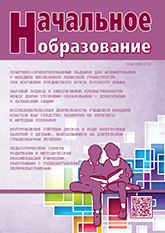The article highlights the issues of the teacher's use of didactic games as a form of teaching organization and an effective means of preventing and reducing anxiety among younger students in the process of educational activities in the classroom. The concept of "school anxiety" is characterized. The importance of didactic games for the development of children’s ability and desire to learn, increasing their intellectual activity, enriching the experience of communicative interaction with classmates, forming a sense of camaraderie and responsibility for the team result is considered. The possibility of conducting educational games in the development of any subject content has been substantiated. Examples of didactic games for working in mathematics lessons with first-graders showing anxiety are given.
the functions of the game in the life of the child; junior schoolboy; the process of educational activities; didactic game as a form of teaching organization; the concept of "school anxiety"; ways to reduce and overcome anxiety; stimulating children's motivation to learn; development of communication skills in the course of team didactic games
1. Vinogradova N.F. Rolevaya igra kak metod razvitiya tvorcheskoy kommunikativnoy deyatel'nosti mladshego shkol'nika [Role-playing game as a method of developing creative communicative activity of a junior schoolchild]. Nachal'noe obrazovanie [Primary education]. 2019, I. 5, pp. 3-12. DOI: https://doi.org/10.12737/article_5daffedf009060.26065757; EDN: https://elibrary.ru/DYNJPF
2. Kotel'nikova E.A., Frolova L.A. Ispol'zovanie didakticheskoy igry pri obuchenii orfografii [The use of didactic games in teaching spelling]. Nachal'naya shkola [Elementary school]. 2009, I. 10, pp. 30-32. EDN: https://elibrary.ru/KYNWNR
3. Krupskaya N.K. O doshkol'nom vospitanii: sb. statey i rechey [On preschool education: Sat. articles and speeches]. Moscow: Prosveshchenie Publ., 1973. 288 p.
4. Stepanova O.A. Didakticheskie igry na urokakh nachal'noy shkoly [Didactic games in primary school lessons]. Moscow: Sfera Publ., 2003. 96 p.
5. Uman A.I. Uchebnye zadaniya v protsesse obucheniya [Study assignments in the learning process]. Moscow: Pedagogika Publ., 1989. 54 p.






